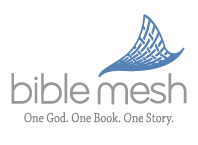The other day, the BibleMesh team received a photograph of a banner bearing our trademark motto, “One God. One Book. One Story,” along with “2011 The Year of the Bible.” It was hanging on a church fence in the UK and, no doubt, was doing some good, lifting up the Bible and its unity around the gospel of Christ. But nobody cleared with us? Well, so what? And wouldn’t it be churlish to object?
In this connection, I’m reminded of Luke 9:49-50, where Jesus rebuked his disciples for their turf-mindedness: John was complaining, “Master, we saw someone casting out demons in your name, and we tried to stop him, because he does not follow with us.” But Jesus responded, “Do not stop him, for the one who is not against you is for you.” If we’re all working for Jesus, what does it matter which group of disciples gets the credit?
For me, it’s déjà vu all over again. When I worked in the Southern Baptist denominational office, I was tasked with superintending the official logo, which features a cross rising above an open Bible, with a globe positioned behind it. It’s a handsome, compelling image, and it proved to be popular among non-Southern Baptists too. Others would use it on brochures, stationery, and church signs, and I would drop them a line reminding them of its provenance. Since the people using it were evangelicals, we didn’t press beyond this.
But when we started a new publication called SBC LIFE, the shoe was on the other foot. Our original “flag” at the top of the front page featured a sans serif font, with the logo set against a blue background, SBC set against green, and LIFE set against red. When our attorney ran a check, we found that LIFE magazine, which had ceased regular publication, said we had come too close for comfort. Though there was no confusing the two periodicals, we had to flip the color backgrounds, putting green behind LIFE, and then go with a serif font. No problem.
But how can one be so picky, and imperious? Since when does somebody own the block, white LIFE and a red background? the image of a cross, a globe, and a Bible? the expression, “One God,” or “One Book,” or “One Story”? Well, first of all, one doesn’t “own” the elements in isolation, but only as they’re juxtaposed and assembled in unique ways. And if we couldn’t “own” these assemblies, we would have a lot more chaos and penury. What of the vacationing family who is shocked to find escargot or chitlins under the Golden Arches, and the real McDonald’s chef who loses his job because tourists drive by instead of risking another menu shock?
A trademark is matter of reputation, something the Bible values. For instance, Proverbs 21:1 says that “a good name is to be chosen rather than great riches” and Ecclesiastes 7:1 says it is “better than precious ointment.” And throughout the New Testament, Christians are exhorted to behave in such a manner that the Christian “brand” is associated with integrity, diligence, and thoughtfulness. Not surprisingly, “respectability” shows up in the list of qualifications for church leaders in 1Timothy 3.
So we need to be careful with reputations, and, by extension, logos and mottos. If not, we can sow distrust, confusion, and even unwarranted honor.
But what if a church doesn’t have the resources to come up with their own cool trademark? Well, first, ‘resources’ is the operative word here. It really did cost us time and money to work out this six-word expression, along with the “mesh-dove” graphic. And churches should know there’s a lot of great, affordable Christian imagination on call out there (much of it free from denominational offices), and it can be joy to establish your own identity within the body of Christ.
As Jesus said, in Matthew 7:21, “Not everyone who says to me, ‘Lord, Lord,’ will enter the kingdom of heaven, but the one who does the will of my Father who is in heaven.” It really helps to know which of the groups and programs saying “Lord, Lord” are the real deal and which of those claiming fealty to Scripture can be trusted. That’s why we need “signatures” to keep things straight.
In a sense, it would be flattering to find your name attached to an excellent piece a stranger wrote, but most of us would just as soon decline the honor.
